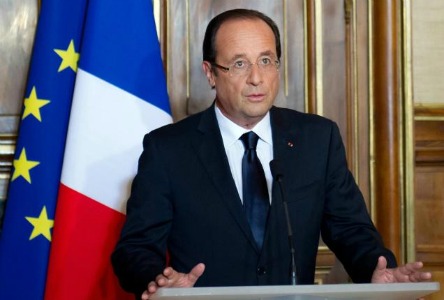
Photo credit: thehindu.com
BAMAKO, Mali (AP) — French President Francois Hollande declared Thursday that the war on terror had been won in the West African nation of Mali, listing the towns that French and Malian troops liberated from al-Qaida’s local fighters earlier this year.
Hollande spoke before more than a dozen heads of state at inauguration festivities for Malian President Ibrahim Boubacar Keita, who overwhelmingly won the election that France urged Mali to hold only months after the radical jihadists had been largely ousted from power in northern Mali.
“We have won this war; we have chased out the terrorists; we have secured the north and finally … we have, you have organized an uncontested election and the winner is now the president of Mali,” Hollande told the crowd gathered at a sports stadium in the Malian capital.
“If there had not been an intervention, today the terrorists would be here in Bamako,” he said.
Several radical Islamic militant groups were able to seize control of northern Mali in the aftermath of a March 2012 coup in the distant capital of Bamako. Once in power, they instituted their harsh interpretation of Islamic Shariah law, meting out amputations and whippings as punishments and forcing women to wear the veil in public.
As they threatened to push further south, France launched a military operation in January that was joined by soldiers from a number of neighboring countries. The Jihadists retreated from major centers in the north including Timbuktu and Gao.
However, some analysts cast doubt on Hollande’s claim of victory.
There are “persistent reports that jihadists have either started filtering back into Mali or never left,” said Andrew Lebovich, an analyst who focuses on political and security issues in the Sahel and North Africa.
“While the French intervention reversed the jihadist push south, significantly degraded the capacity of regional terrorist groups to operate in Mali and killed or scattered a large number of fighters and commanders, it is a stretch to say that the war is won,” he said.
Keita formally took the oath of office two weeks ago as was required by the country’s constitution. On Thursday, Malians in their finest suits and traditional gowns poured into a sports stadium for the festivities, fanning themselves with programs in the heat and shading themselves with umbrellas.
The new president entered the stadium standing in the back of a military jeep draped in Malian flags, wearing a yellow sash accented in the other colors of the national flag – red and green. Throngs of soldiers ran alongside his vehicle, holding hands to form a barricade against well-wishers approaching him.
Keita spent much of his speech thanking regional leaders for their help in dislodging the extremists, and pledged to restore Mali’s democratic institutions that were battered by the coup and the months of chaos that followed.
“The path will be long, but we will get there with the participation of all Malians,” he said.
Keita emerged from a field of 28 candidates to overwhelming win the August presidential runoff election, taking nearly 78 percent of the vote in the second round.
Among his greatest challenges will be resolving the simmering secular separatist rebellion in the northern region of Kidal. Ethnic Tuaregs there have sought sovereignty ever since Mali’s independence from France in 1960 and their latest rebellion last year gained momentum in the power vacuum after the coup. While they were temporarily sidelined during the rule of the radical jihadists, the Tuareg separatists are now largely back in control of Kidal and the return of the Malian military remains deeply unpopular.
Talks are set to begin within two months’ time between Keita’s new government and the group known as the National Movement for the Liberation of Azawad, the name rebels use to describe their homeland.
While in Bamako on Thursday, Hollande and African leaders are also expected to discuss the deteriorating security situation in Central African Republic, where the rebels who ousted the president six months ago are accused of killing scores of civilians and carrying out other atrocities.
